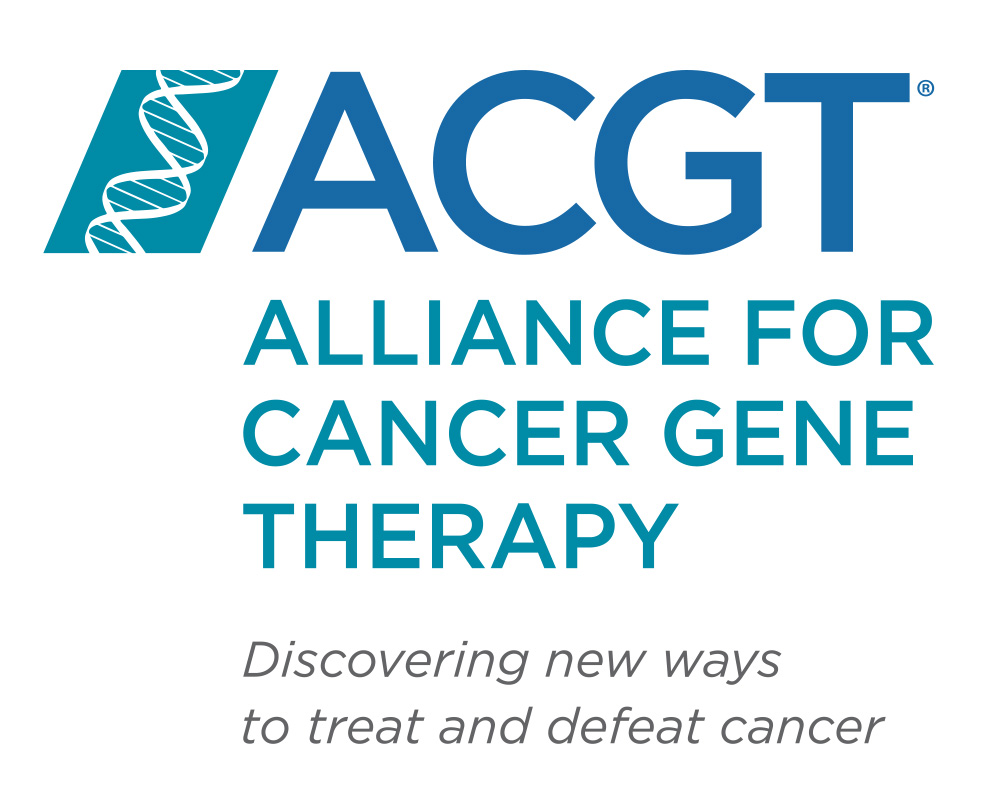
Alliance for Cancer Gene Therapy (ACGT), the nation’s only charitable organization dedicated exclusively to funding cancer cell and gene therapy research, is proud to announce the recipients of its 2018 research grants using innovative clinical approaches to find gene therapy treatments for solid cancers.
Recipients of this year’s grants include: Joseph Glorioso, MD, PhD, of the University of Pittsburgh, and Gary Cohen, PhD, of the University of Pennsylvania, who are working together on a vaccine for melanoma; Matthias Stephan, MD, PhD, of the Fred Hutchinson Cancer Research Center in Seattle, Washington, who is creating an injectable genetic agent to more effectively program T cell receptors; and David Reardon, MD, of Dana-Farber Cancer Institute in Boston, Massachusetts, who is developing a CAR T cell therapy for deadly brain cancer. The three grants are each in the amount of $500,000, paid over the next two or three years, depending on the time-frame of the research.
“This work represents the next generation of gene therapies,” noted Margaret Cianci, executive director of ACGT. “Two of the three grants fund crucial research leading to the development of cancer vaccines, among the most promising forms of gene therapy. These vaccines are not like traditional vaccines – no live pathogens are used to establish a barrier to the disease. Instead, cancer vaccines contain inactive viruses or a patient’s modified cancer cells to penetrate just the cancer and then serve as a beacon for the immune system to attack. Advances in medical technology have also made it possible to customize vaccines to DNA and to specific forms of cancer. We are very excited about this research and hope to see major steps forward in the treatment of solid cancers with these different methodologies.”
ACGT has been funding scientific research in the cancer gene therapy field since 2001 and has been instrumental in funding some of the most innovative scientists of the past decade, including Dr. Carl June of the University of Pennsylvania for his CAR T gene therapy research to treat leukemia. Dr. June received his first ACGT grant in 2004 and a second in 2008, back when gene therapy was considered a “risky proposition” according to Cianci. Fast forward to 2018 and the field has changed dramatically with major pharmaceutical companies and research institutions vying for the next big discovery using gene therapy or immunotherapy.
“Solid tumors present different challenges as they are more complex than blood cancers and put up more barriers to the immune system,” noted Cianci. “Cancer gene therapy science is proving to be life-changing for patients and we are proud to be a part of it.”
This year’s ACGT grant recipients are:
Joseph Glorioso, MD, PhD
Professor, Microbiology and Molecular Genetics, University of Pittsburgh
Chair, ACGT Scientific Advisory Council
Gary H. Cohen, PhD
Professor, Microbiology, University of Pennsylvania
Drs. Glorioso and Cohen will share a two-year ACGT grant to support a study to develop a cancer vaccine for melanoma. Their research builds on previously successful results using a tumor-targeted, actively replicating herpes virus to infiltrate cancers and stimulate an immune system assault. Dr. Glorioso calls the methodology a “heat-seeking missile that targets metastatic cancer for destruction.” The treatment doesn’t stop there. Once the cancer is eliminated, the vaccine inserts an immunity barrier to protect against recurrence. Melanoma is among the most deadly cancers and this treatment offers new hope.
Associate Professor, Fred Hutchinson Cancer Research Center, Seattle, Washington
One of the challenges to an effective cancer vaccine is that not enough of a patient’s white blood cells recognize the cancer. The goal of Dr. Stephan’s research is to develop injectable genetic agents to more effectively program T cell receptors (TCR) to target specific proteins found on the cancer. Once the cancer is destroyed, these programmed cells will transform into memory cells that prevent relapse. The process makes cancer vaccines potentially more effective in collaboration with other treatments as well, and the research is applicable to many forms of cancer. Dr. Stephan is paving the way to the next chapter in cancer gene therapy.
David Reardon, MD
Professor of Medicine, Dana-Farber Cancer Institute, Boston, Massachusetts
Dr. Reardon is leading laboratory research into CAR T cell therapy for a deadly brain cancer, based on the FDA-approved treatment for leukemia and lymphoma. This form of immunology has yet to be an option for cancers like glioblastoma because proteins associated with solid tumors often also exist in normal tissues. In addition, the cancer is determined to reject immune system intervention. Dr. Reardon has developed a unique two-step approach to knock out the built-in resistance and bind the tumor with an antibody recognized by T cells to sustain immunity. Results should lead to a clinical trial.
About Alliance for Cancer Gene Therapy (ACGT)
Established in 2001, ACGT is the nation’s only non-profit dedicated exclusively to funding cell and gene therapy research for all types of cancer. One hundred percent of contributions go directly to research. Since its inception, ACGT has funded some of the underlying science that has resulted in the formation of either licensing agreements or biotech companies including Novartis, Ziopharm, Juno, Tmunity, Turnstone Biologics, all of which are in various stages of bringing new treatments to patients. ACGT has funded 58 grants in the U.S. and Canada to conduct and accelerate critically needed innovative research. 36 of those grants have gone to Young Investigators for basic research and 22 grants to Clinical Investigators, totaling more than $29 million in funding. ACGT is located at 96 Cummings Point Road, Stamford, Connecticut 06902; 203-358-5055.
To learn more, visit acgtfoundation.org or join the ACGT community on Facebook, Twitter and YouTube at @acgtfoundation.